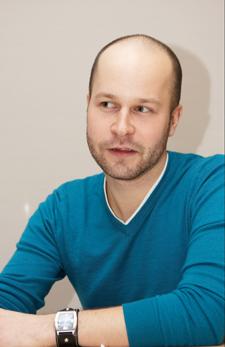On the outside, Eric Lefebvre is the antithesis of what you might expect of a typical nurse. Instead of pastel, floral print scrubs, he sports business-casual attire. Instead of performing nursing duties in a hospital setting, he provides sexual health services at bathhouses, bars and community clinics.
It was a high school aptitude test that led Lefebvre to nursing. His results showed that the three careers most suited for him were teacher, psychologist and nurse.
“With nursing, I can act as a teacher, counselor, and nurse all in one,” Lefebvre says. “And health is a very important topic. A lot of things depend on your health. I think nursing was a good choice.”
Lefebvre is from Iroquois Falls, a small town outside of Timmins, Ontario. He’s a bilingual Francophone, with only the slightest hint of accent.
After only two years as an area nurse, he’s already a familiar face to the city’s gay community. He works for Ottawa Public Health’s Healthy Sexuality and Risk Reduction Program. By day, Lefebvre works at the Sexual Health Centre on Clarence St. By night, he conducts bathhouse outreach and offers STI testing at gay events and bars.
“I really like working in the field of sexual health. I like the prevention and education aspects,” he says. “It’s great to see people take their health into their own hands. It’s so satisfying when people like the services they receive, and when people remember me and are happy to see me.”
Being a male nurse also has its advantages.
“As a male, I can work in a bathhouse, which is really interesting. The staff are nice and people appreciate that I’m there offering testing,” he says.
“Even if people don’t get tested at the bathhouse, it’s a good reminder. And it’s great that we can offer this service to people who might not otherwise get tested.”
One of the highlights of Eric’s work is with GayZone, a sexual health clinic for guys into guys.
Operating since September 2008, Gay Zone is a pilot project that has the support of Ottawa Public Health. The clinic is held at the Centretown Community Health Centre.
“The project aims to normalize testing in a hassle-free way, and tests can be anonymous,” Lefebvre says. “It also provides a place outside of bars and online where we can meet other people and network.”
With Gayzone, Guys into guys can access sexual health services and social activities in the same venue. In addition to vaccination, testing and treatment services, GayZone offers activities like free yoga, book clubs, smoking cessation groups and even karaoke.
Lefebvre points out a few of the benefits of having a clinic like this one.
“We [the health providers] are culturally aware of the issues specific to gay men. Family doctors deal with so many issues, [but] we have the chance to catch things that a family doctor might not notice.”
Lefebvre is passionate about his profession and plans to stay that way.
“I can see myself working in the field of sexual health for a long time, but I also feel like there are other fish to fry — maybe higher up in government.”
In the meantime, he continues to promote healthy sexuality — one man at a time.
Gay Zone operates Thursday evenings from 5-8pm at the CCHC, 420 Cooper Street.

 Why you can trust Xtra
Why you can trust Xtra


